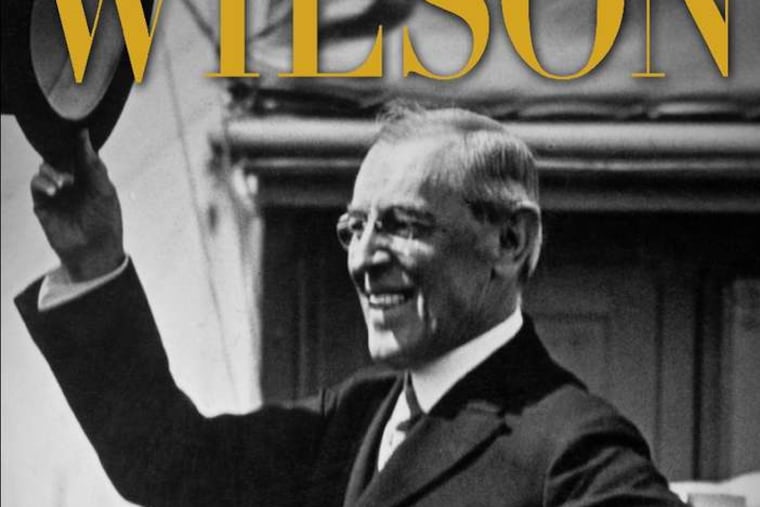A definitive study of Woodrow Wilson
Scott Berg, author of the best biography of Charles Lindbergh, has turned his attention to one of the most unusual presidents in American history, Woodrow Wilson.

Wilson
By A. Scott Berg
G.P. Putnam & Sons. 791 pp. $40
nolead ends nolead begins
Reviewed by John P. Rossi
Scott Berg, author of the best biography of Charles Lindbergh, has turned his attention to one of the most unusual presidents in American history, Woodrow Wilson.
The only president with a Ph.D. and the only one whose career was rooted in academe, Wilson's reputation has fallen in recent years as presidents such as Harry Truman, Dwight Eisenhower, and Ronald Reagan have pushed him out of the Top 10 chief executives. Berg seeks not so much to revive Wilson's claims to greatness, but to examine a political life unique in American political history.
Wilson was born in Virginia in 1856 and his worldview was shaped by the Civil War and the Reconstruction period that followed. Wilson remained an unreconstructed Southerner. He was never able to accept the concept of racial equality, told "darky" jokes, using an African American dialect for humor his entire life. As president of Princeton, he refused to admit African American students, and none would receive an undergraduate degree from the university until the 1940s. Wilson's administration also was the most segregated of any since the Civil War.
Berg notes that no president in American history achieved the presidency with less political experience than Wilson. He served for just over 600 days as governor of New Jersey before winning the presidency in 1912 in a three-way fight against incumbent William Howard Taft and Theodore Roosevelt, who was trying to make a political comeback.
Wilson came to power, Berg points out, just as the Progressive movement reached maturity. During his first term, he showed a sure gift for political maneuvering. Reforms of the tariff, creation of the Federal Reserve System as well as the constitutional amendments allowing for a federal income tax, and the direct election of senators became law during his first years in office.
The heart of Berg's book centers on Wilson's role during World War I and the subsequent controversy over whether the country should join the League of Nations. As Berg demonstrates, for Wilson every issue, political or otherwise, was moral. He believed, as he told an associate, that "God ordained that he should be . . . president."
Wilson's intense moralism surfaced during the war in often unpleasant ways. Thus, he sold the American public the necessity of entering the war on the grounds that the "world must be made safe for democracy," an overarching claim that would not fare well in the political wheeling and dealing at the peace conference.
Wilson also repressed dissent during the war more sharply than Lincoln had in the Civil War or Franklin D. Roosevelt would do in World War II. Pacifists and radicals were imprisoned and some were deported. The teaching of German, German music, and even German words such as sauerkraut and dachshund were banned as somehow disloyal. There was a vindictive streak in Wilson, leading journalist H.L. Mencken to describe him as the perfect example of a Christian cad. When the revered old socialist Eugene Debs denounced the war and was sentenced to 10 years in prison, Wilson refused to grant him amnesty, claiming Debs "was a traitor . . . and he will never be pardoned during my administration."
The war and its aftermath destroyed Wilson's reputation. The sure touch of his first term gave way to intellectual arrogance. He personally led the American delegation to the Paris peace conference and took no leading Republican with him, undermining any possibility of bipartisanship.
During the negotiations at the conference, the European statesmen quickly recognized that Wilson would compromise anything to gain acceptance for his concept of the League of Nations. As a result, the final treaty was loaded with financial and territorial terms unacceptable to the American public.
Wilson's struggle to get the treaty adopted constitutes the final tragic phase of his life. Opponents in the Senate, led by Henry Cabot Lodge, amended the treaty with reservations Wilson refused to accept. Wilson, who spent six months negotiating compromises in Europe, would not accept any of the Senate's amendments.
Berg links Wilson's stubbornness over this issue to his declining health. Wilson had suffered a series of minor strokes dating to 1896 that began to undermine the political flexibility he once had. He refused to listen to his closest advisers and tended to rely on his second wife, Edith, a relatively uneducated woman, whose advice was almost always bad. While campaigning for his treaty, Wilson suffered a massive stroke and was largely incapacitated for the rest of his life.
Berg's biography is by far the best single study of Wilson's life and times. It is based on solid documentary sources the author handles with skill. His Wilson is a combination of farsighted statesman and flawed personality. Berg's study should remain the standard biography of this tragic figure for a long time.